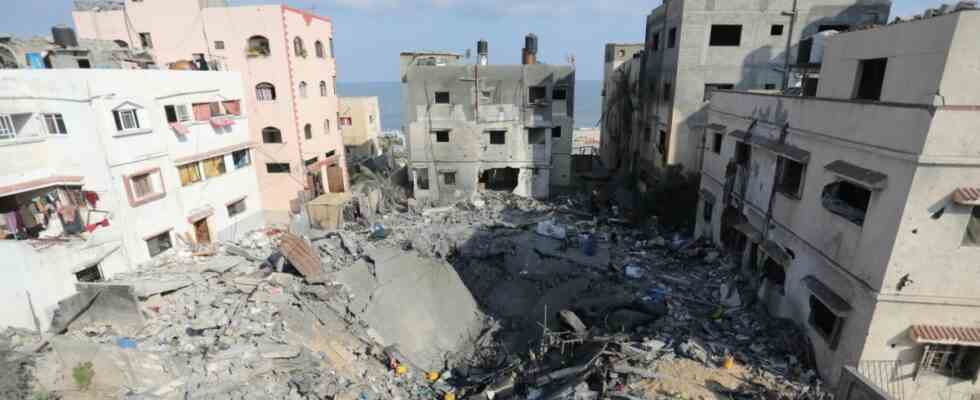The reason why the conflict around the Gaza Strip has not escalated any further is Hamas’ restraint. The organization that has governed the Gaza Strip since 2007 has not directly interfered in the conflict between Israel and Islamic Jihad. As part of its “Dawn” military operation, which it launched on Friday, the Israeli army has primarily targeted high-ranking fighters from Islamic Jihad – a group rivaling Hamas. Hamas thus benefits from a weakening of this inner-Palestinian competition.
The Al-Quds Forces, which form Islamic Jihad’s military wing, on Monday released an account with pictures of 12 militants who have been killed in the past three days. Among them are their military chief Taisir al-Jabari and the southern commander of Islamic Jihad in the Gaza Strip, Khalid Mansur, and his deputy.
The Israeli army spoke of the success of their precise strikes – even though 44 people died, including several children and women. Even US President Joe Biden urged a “timely and thorough investigation of all these reports” of civilian casualties, even as the US generally endorsed the military action.
The Islamic Jihad leadership in the Gaza Strip has been severely decimated, but has expressed its assessment that the Egyptian-brokered ceasefire, which went into effect Monday night, constitutes an “Israeli surrender.” At the very least, demands for the release of Islamic Jihad leaders and fighters held in Israeli jails have been rumored as a condition of their agreeing to the deal. Israel’s government said on Monday that it would not respond.
The militant Palestinian organization sees the massive hail of rockets aimed at Israel as its success. Not only were around a thousand projectiles fired in the direction of Israel in three days, but they also reached Tel Aviv and Jerusalem, where they were intercepted by Israeli missile defenses.
The considerable arsenal of weapons is financed by Iran
Islamic Jihad thus showed once again that its armed wing, the al-Quds Forces, has a considerable arsenal of rockets and mortar shells. The money for the procurement comes from Iran, the import succeeds despite the lockdown via Egypt. The components are then screwed together in the Gaza Strip – which is not always possible. According to the Israeli army, 160 rockets have failed to leave the Gaza Strip in the past three days. According to Israeli experts, Hamas has better material and longer-range missiles.
The two organizations are united by hostility towards Israel. But at the same time they are in competition with each other and pursue different strategies. Islamic Jihad has established itself as the spearhead of the Iranians in the Palestinian territories, providing training, expertise and, most importantly, money. Their leader, Ziad al-Nakhalah, was meeting with Iranian President Ebrahim Raisi in Tehran just as the Israeli military operation began.
Ibrahim Freihat of the Doha Institute describes Islamic Jihad and its military arm as “very efficient and very well organised”. There is a strong order within the organization that will probably regroup after the targeted killing of its leaders in the Gaza Strip.
Islamic Jihad is significantly smaller than Hamas. The number of active fighters is estimated at at least a thousand – Hamas is said to be able to count on more than 5,000. Unlike Hamas and Fatah, which rules in the West Bank, the organization rejects negotiations for a peace with Israel and does not take part in elections, it concentrates entirely on the armed struggle against Israel.
The uncompromising fighters gain respect from the population
Islamic Jihad has enjoyed great popularity in recent years, particularly in the Gaza Strip. While Hamas, which has ruled in the isolated coastal enclave since 2007, is increasingly wearing out of power and people grumble under the rulers’ heavy hand, the uncompromising jihad fighters are gaining respect points from parts of the population for whom Hamas seems too willing to compromise.
The organization has been around ten years longer than Hamas. It developed in the late 1970s from former Palestinian members of the Egyptian Muslim Brotherhood. Islamic Jihad is blamed for the bombings in Lebanon, but also for suicide bombings.
This gives Israel a powerful adversary that is far more unpredictable than Fatah or Hamas. Israeli officials on Monday let the media know that they are now seeking a more far-reaching agreement with Hamas – which observers see as a kind of reward for not taking action in the recent dispute.

